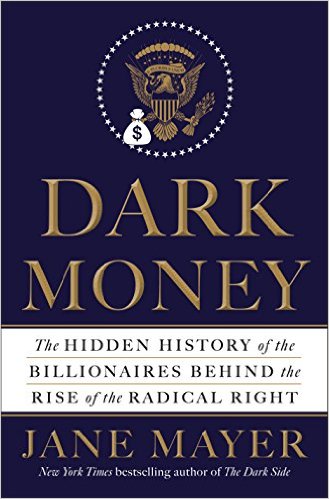Dark Money, by Jane Mayer
Jul 18
2016

On August 30, 2010, Janet Mayer published an article in the New Yorker called 'Covert Operations', an in-depth look at the political influence of Charles and David Koch, two American billionaire brothers who have devoted over a hundred million dollars to promoting libertarian causes. Over the next few years Mayer deepened and expanded her research on the subject, transforming her article into the nonfiction book Dark Money: The Hidden History of the Billionaires Behind the Rise of the Radical Right.
While Dark Money focuses almost exclusively on figures from the far right of the political spectrum, the book is actually depicting a non-partisan concern: under our current laws, extremely wealthy Americans can avoid paying taxes by devoting a portion of their riches to “philanthropy”—even if said philanthropy is solely devoted to forwarding a self-serving political agenda. (The Koch brothers, for example, have generously donated to causes that fight for lower environmental and labor regulations, both of which benefit their wildly successful industrial empire.) The end result has been the creation of a shadowy, unelected, and hugely powerful force in American politics.
Despite their unrelated subject matter, Dark Money reminds me of my all-time favorite nonfiction book: Marc Reisner's Cadillac Desert. Both books are highly readable, carefully researched, and—best of all—answer questions that it had never occurred to me to ask. I was already aware of Koch brothers before reading Dark Money, but I had no idea of the scope of their power, or the legal loopholes that allowed them to purchase so much influence. One of the last anecdotes in Mayer's book is the amount the Kochs and their allies were hoping to spend during this year's election cycle: $889 million (in context, the Republicans and Democrats are expected to spend $1 billion each). That kind of fund can buy an insane amount of political influence, and I'm grateful to Mayer for putting names and faces to the people who wield it.
While Dark Money focuses almost exclusively on figures from the far right of the political spectrum, the book is actually depicting a non-partisan concern: under our current laws, extremely wealthy Americans can avoid paying taxes by devoting a portion of their riches to “philanthropy”—even if said philanthropy is solely devoted to forwarding a self-serving political agenda. (The Koch brothers, for example, have generously donated to causes that fight for lower environmental and labor regulations, both of which benefit their wildly successful industrial empire.) The end result has been the creation of a shadowy, unelected, and hugely powerful force in American politics.
Despite their unrelated subject matter, Dark Money reminds me of my all-time favorite nonfiction book: Marc Reisner's Cadillac Desert. Both books are highly readable, carefully researched, and—best of all—answer questions that it had never occurred to me to ask. I was already aware of Koch brothers before reading Dark Money, but I had no idea of the scope of their power, or the legal loopholes that allowed them to purchase so much influence. One of the last anecdotes in Mayer's book is the amount the Kochs and their allies were hoping to spend during this year's election cycle: $889 million (in context, the Republicans and Democrats are expected to spend $1 billion each). That kind of fund can buy an insane amount of political influence, and I'm grateful to Mayer for putting names and faces to the people who wield it.
Posted by: Julianka
No new comments are allowed on this post.
Comments
No comments yet. Be the first!